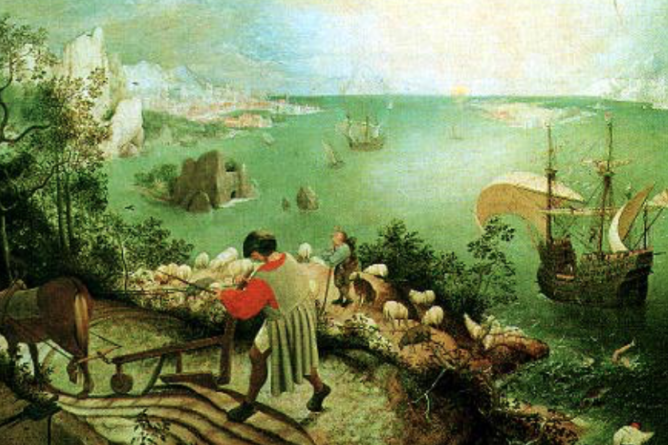Musee des Beaux Arts W. H. Auden About suffering they were never wrong, The old Masters: how well they understood Its human position: how it takes place While someone else is eating or opening a window or just walking dully along; How, when the aged are reverently, passionately waiting For the miraculous birth, there always must be Children who did not specially want it to happen, skating On a pond at the edge of the wood: They never forgot That even the dreadful martyrdom must run its course Anyhow in a corner, some untidy spot Where the dogs go on with their doggy life and the torturer's horse Scratches its innocent behind on a tree. In Breughel's Icarus, for instance: how everything turns away Quite leisurely from the disaster; the ploughman may Have heard the splash, the forsaken cry, But for him it was not an important failure; the sun shone As it had to on the white legs disappearing into the green Water, and the expensive delicate ship that must have seen Something amazing, a boy falling out of the sky, Had somewhere to get to and sailed calmly on.
About Suffering In that first apartment, dank Baltimore basement, I etched Auden’s poem onto my tablecloth, shaking the flimsy table, pressing down in windowless gloom before climbing up into gray sunlight to join the other would-be poets in our beige metal classroom tucked somewhere I can’t recall -- perhaps on the edge of that famous university known mostly for launching serious doctors. There, we pursued our dreadful martyrdom to art, glorified our untidy lives and mundane disasters, thought we could torture our unsuitable affairs and boring mistakes into important failures. We imagined we were cheating pain into poetry, weaving song from meaningless suffering. . . . Now we are old, and nameless, and at least one of us is a ghost. Breughel’s green water still hangs on its museum wall, and Auden's words echo there like dust, multiplied by the internet to infinity.
Suggested soundtrack: Father John Misty, “Pure Comedy”

